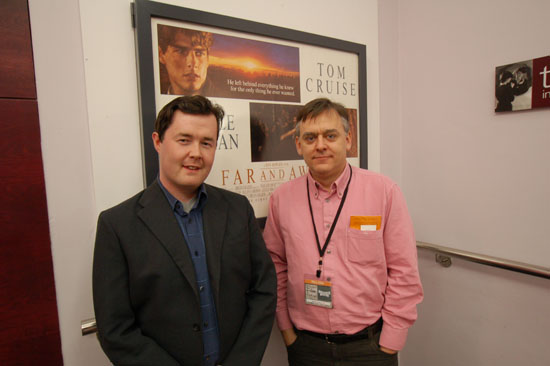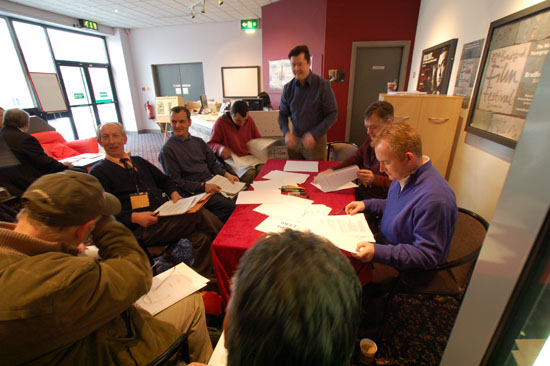Re-introduction of 70mm as a Commercial Cinema Exhibition Format
|
Read more
at in70mm.com The 70mm Newsletter |
| Written by: Ramon Lamarca Marques with assistance of Brian Guckian | Date: 7 March 2006 |
 Brian
Guckian and Ramon Lamarca Marques. Image by Thomas Hauerslev Brian
Guckian and Ramon Lamarca Marques. Image by Thomas HauerslevThomas has asked me to write some notes about a very interesting debate on the Film-Tech website, which could be debated over the weekend. I have got a very short space of time and I have asked Mr. Brian Guckian, who has also participated in the debate and who will be there on Sunday in Bradford, to help me with it. This is just a "starter" to encourage you to read the 30 plus pages on the Film-Tech website (and it is growing!!!). Basically the debate discusses the issue of the arrival of 2K digital projection as a standard for cinema exhibition, and compares it to 70mm screening. As you will all probably know, 70mm is extremely better than 2k digital projection. There is no secret about it, but you can find the technical explanations on the Film-Tech website. In particular we have found what Mr. John Pytlak from Kodak has to say about the technical aspects of film, especially regarding the three times information that 65mm has got when compared to the 35mm negative, very interesting. We suggest you read the first post by Mr. Larry Shaw, which centres the debate. It has occurred to many of us that digital screening is the first cinema technology that brings nothing to audiences, actually for many of us it removes something very important, film! So, obviously the reason for the implementation of digital is economical, nothing else. But then, a question arises. If you can see a film digitally on a small screen, on a badly decorated multiplex, with 5.1 digital sound, and a lot of people crunching and munching, and mobile phones galore, for £8 per person, or if you can see it digitally at home, with your own home cinema projector, without ads, without mobiles, without munching, and for £3 for all your family, which one would you choose? The answer is clear, and many people have already decided: at home. Cinemas have been left with no unique product to sell, to this we have to add the very short window period between cinema release and video release, which may disappear completely in the future. So the future of cinema exhibition looks pretty doomed. The question is then: Is there an audience for premier cinema? 65mm-originated film printed on 70mm has got a perfection that digital will probably take a long, long time to reach. Then, why not bring back 65/70? Answers to this can be found on the debate. |
More
in 70mm reading: White paper - Re-introduction of 70mm Workshop Report Widescreen Weekend Internet link: To find the thread, go to Film-Tech » Film-Tech Forums » Film Handler's Forum » 70 vs. DC 5 pm / 17:00 Pictureville Sunday 12th March, please gather in the foyer |
 Brian
Guckian chairing the workshop. Image by Thomas Hauerslev Brian
Guckian chairing the workshop. Image by Thomas HauerslevAs much as I personally like square Academy ratio films in black and white, these are no longer viable, because people stopped paying to see them at the pictures when they got them on television. What I mean is that the film language has had to adapt to the market. As much as Fritz Lang thought that CinemaScope served only to film snakes, MGM made him shoot "Moonfleet" in CinemaScope. So, to survive, cinema exhibition has had to mutate, to distance itself from television product. With digital it is the first time that cinema exhibition not only does not distance itself from telly, but does in fact get closer. I believe that studios and distributors think that cinema exhibition is something that will disappear at some point in the near future and are trying to minimise expenses whilst cinemas still operate. "How The West Was Won" in Cinerama will never look good on a home cinema environment. This is what is needed, films that from the phase of pre-production are conceived to make the most of the big canvas of the cinema screen. We now intend to explore all possibilities in relation to reviving the 70mm format commercially and intend to begin with a Workshop at the Widescreen Weekend in Bradford this year. The details of this will be made known shortly. The Workshop will cover three areas: Technical, Financial and Marketing and is open to all. Everyone's contributions will be recorded, and the Workshop can then be continued, for wider contributions, on in70mm.com, which Mr. Thomas Hauerslev has very kindly agreed to. A great many positive and exciting possibilities have already been proposed, from 65mm origination, to dye transfer, to 9 channel uncompressed sound, and we wish to mobilize the tremendous expertise, creativity and passion for quality that we know is out there. So don't miss this opportunity to take part in what promises to be a special event! |
|
| Go: back
- top - back issues
- news index Updated 22-01-25 |
|
